#he has no flaws or interesting facets! who is this man!
Explore tagged Tumblr posts
Text
where do i contact mathieu cote to ask he grab ahold of felix richter and maybe recede that hairline a little bit
#dibi#dbd#i have like. vague opinions on felix#my big one is he just isnt that attractive#he has no flaws or interesting facets! who is this man!#hes just. aryan and chiseled and world renowned in a high paying field and has a wife and child and somehow time to maintain abs#and its just like.. this isnt an interesting person#he and vittorio both feel like they were designed to sell cosmetics over being interesting#give him a divorce. remove the sharp jawline. add a beer belly. idk any of the above#he'd be better for it!#sometimes bhvr's original survivor concepts make me worry they're distinctly afraid of creating a sad wet sack of a person#i don't think the modern bhvr / dbd team could have made dwight fairfield.#im sorry bc this isnt a personal attack but i think people who want shirtless felix sound a bit vapid#the man just lacks appeal#i've been thinking about this bc his new shirt cosmetic is ill fitting as hell#and it somehow immediately improved the character for me#like god damn finally he wears a tshirt like a dad would! and not a fashion model
4 notes
·
View notes
Text
Mr. Curly Mouthwashing is such an interesting and tragic character to me. Not tragic in the way that Anya is- good God, not in the way that Anya is. But tragic in the way that he is a victim of himself, of his own naivety, of his own limited perspective and blind trust. A victim of his own actions and arrogance, and a victim of the direct consequences that stemmed from his poor decisions.
I see a lot of people reading Curly’s character in a way that I just personally didn’t. I could very well be wrong, and I’m certainly open to the possibility, but I actually prefer to think that I’m right, because it’s these layers and dimensions to his character that make him so interesting and complex.
He wasn’t a “bad” guy. Not in the way that Jimmy is, who had every opportunity to do the right thing just ONCE, and yet failed to, because that selfishness and cowardice is ingrained in his very core. Unlike Jimmy, Curly was just an ignorant guy. Not malicious by intent, but ignorant nonetheless. That doesn’t justify anything he did, or anything he failed to do, but it explains more about him than a simple write-off of his character does.
Curly was operating under an illusion of grandeur. His belief of his power transcended his position and extended into every facet of his life. His approach to confronting Jimmy wasn’t because he didn’t believe Anya, but because he viewed Jimmy as misunderstood just as much as Jimmy himself did. He inappropriately sought nuance in a situation that didn’t need it. On top of Curly and Jimmy’s history and camaraderie- as well as Jimmy’s raging victim-complex that so obviously influenced Curly’s perception of him- the fact that he was disillusioned by the extent of his control ultimately led him in failing to protect his crew. Anya especially.
In the very beginning of the game, we see him talk about how he knows he should have raised more of a concern about adding a fifth member of his crew without enough cryo-pods to accommodate Daisuke. It is this blatant dismissal of safety protocol that reveals just how shortsighted and ignorant Curly can be. And when Anya revealed her abuse to Curly, it’s this same ignorance that led him to confronting Jimmy.
Curly wasn’t trying to dismiss Anya, and he certainly wasn’t trying to betray her. He simply lacked her perspective. As a man, he couldn’t begin to fathom the feminine experience with the intrinsic evils of masculinity and the patriarchy. He has this almost childlike sense of optimism, thinking Jimmy would reveal himself to be a deeply flawed and misguided- but ultimately good- person, only to be confronted with the reality of Jimmy’s narcissism, insecurity, and apathy. By then, it was too late. He was an enabler. He had protected Jimmy. He had given him all the resources to hurt the very people he was entrusted to protect. It was a wake up call that came too late, a raising of red flags after Jimmy’s evil had already been revealed.
Curly should be held accountable for his failures and shortcomings- “take responsibility”- but I also believe he should be viewed sympathetically. It’s too easy to brush past the little details that make him so damn human in pursuit of a simple explanation. There are some people, like Jimmy, who have a full understanding of their privilege, and weaponize it as a means to control, coerce and abuse the people around them. Then there are others, like Curly, whose privilege has been so second-nature to them that it becomes entirely invisible. Had Curly realized this earlier, he very well could have prevented the fate of himself, of Anya, of Daisuke, and of Swansea. Even as a victim of Jimmy’s derangement himself, Curly ultimately was a perpetrator in his own right.
I don’t think Curly is a “bad” guy. I think he’s just a wrong guy. A guy who was arrogant, but not malicious. Ignorant, but not evil. He’s just as easy to blame as he is to mourn. He’s a walking paradox. He’s an absolutely brilliant character.
#mouthwashing#captain curly#curly mouthwashing#anya mouthwashing#daisuke mouthwashing#swansea mouthwashing#jimmy mouthwashing#sorry if this makes next to no sense I am so tired#mouthwashing spoilers
211 notes
·
View notes
Text
the perennial Tai Discourse is really interesting to track bc, speaking broadly, the two major camps are just:
those who focus primarily on ruby’s recollection of her childhood and relationship with her dad (and filter what yang says through that lens such that “i had to pick up the pieces and keep things together when i was five” gets diluted into “yang had responsibilities as a child”)
those who focus primarily on yang’s memories and her arc in v4 (and tend to just ignore or minimize the things ruby says that suggest a positive relationship with tai, in particular often just flat out disregarding how excited ruby is to spend time with or receive care packages from him)
when it’s like. yeah that’s. literally the point. that ruby and yang had profoundly different childhoods.
they’re half-sisters in a story about fairytales and only one of them had a decent dad. rwby is unsubtly interrogating the fairytale archetype of the Evil Stepmother/Dead Mother with raven (not dead, but absent) and summer (villain, presumed dead) and that archetype quite literally requires its counterpart archetype of the Neglectful Father who remarries and tacitly participates in the Evil Stepmother’s abuse of his child from his first wife
tai is as much an exploration of the fairytale Neglectful Father as raven is the Dead Mom and summer is the Evil Stepmother. that’s. a core aspect of the narrative surrounding the rose xiao long family.
the Dead Mom often reincarnates as a bird or tree or similar spirit to watch over her child; rwby turns this on its head by reimagining the Dead Mom as an absent one. raven watches over yang in her bird form because she is too afraid to be meaningfully present; she isn’t dead, but her absence in yang’s life is so complete that she might as well have been, and the fairytale tension between the Dead Mom’s death and her lingering presence is explored through these cramped and inadequate half-measures raven takes in trying to have it both ways.
the Evil Stepmother is a vehicle for making the fairytale heroine miserable; she has no identity nor any reason for her monstrous treatment of the child who is not her own. rwby, again, flips this over with the mystery of summer rose. who was she, really? did anyone know? she was a good stepmom—she loved yang like her own daughter—but now she’s gone. she left. she never came back. she lied. she joined salem. why? what expectations did she feel on her shoulders? what broke her? why did she do the things she did?
lastly, the Neglectful Father must either be a love-blind fool or a weak, contemptible man with no love or loyalty to his own blood; he forgets his motherless child at the behest of his new love. rwby turns this on its head too by rendering tai as a human being—messy, flawed, fully-realized. wicked stepsisters exist for the purpose of being spoiled by the Evil Stepmother in juxtaposition with her cruelty to the first child, who is kind and good because she remembers her mother’s lessons. the fairytale children of these archetypes function as repetitions of their mothers. rwby makes that the central conceit of its spin on the Neglectful Father: what if he loved both the Dead Mom and the Evil Stepmother so much and then both of them broke his heart in mirrored ways, leaving him a single father to both of their children? if he sees raven in yang and summer in ruby, how does that color his relationships with both girls? if you take away the Evil Stepmother but not her daughter, does the Neglectful Father remember his first child? or are people more complicated than that?
and with all three, the narrative engages with these one-dimensional archetypes by constructing complicated, multi-faceted characters on top of them; by tossing the simplistic moral didacticism of a fairytale and presuming, first, that everyone is trying their best, that bad choices can be made from good intentions, and that no one gets it right all the time, or even most of the time. love and profound dysfunction can coexist.
ruby and yang had very different childhoods. that’s the narrative foundation the whole rose xiao long family is built on, because they’re a deconstruction of the archetypal fairytale blended family.
#this is also why every permutation of ''tai isnt rubys Real Dad'' is nonsense btw. ruby being yang’s half-sister instead of step-sister is#on purpose. the condemnation of the archetypal fairytale Neglectful Father is he mistreats his own blood in favor of another man’s children#and rwby uses his blood relation to both his daughters to question that framing;#the dynamic doesn’t become any Less dysfunctional if the favored child is equally the father’s by blood
72 notes
·
View notes
Note
for character bingo (if not done already) rosemary please!!

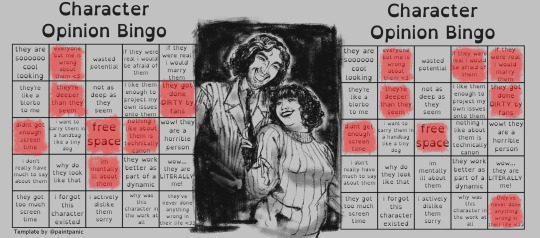
I really love these two.... I should draw them more, I always thoroughly enjoy it.
WOW THIS GOT REALLY EXTREMELY LONG. ITS UNDER THE CUT OK:
I'll start with Jack. I wax poetic about Jack a lot. He's a character that I find incredibly interesting, even if we don't really know particularly much about him yet. A lot of the things that I really like about him are like... interpretive? Or things that I've assumed. Hence the "not technically canon." I think a lot about "Jack Walten" as a like, a concept, within the universe of The Walten Files. Like, he was a man, who lived and had a place and a purpose within his community, but in the wake of his disappearance he's become sort of abstracted. I'm struggling to articulate this. I think of Jack as a character who has lost the ability to contextualize his own existence, and has instead become sort of an icon of himself.
I think to the community of Brighton he is a tragedy. He's a scary story. He's the memory of a man who was so well-known and so well-liked and then he up and disappeared one day and left countless rumors in his wake. And for Felix, I think he's always struggled to think of Jack as a person, and has always considered him more of a representation of his own inadequacy, and then a representation of his guilt. Felix has always kinda used Jack as a way to gauge himself. Like, Jack has always been a point of comparison. But then, Felix's relationship with Jack, to me, has also been a means for Felix to kinda improve his own self-image. I think a lot about Felix's very pleased sort of reaction to Jack's "You're a life saver, Felix." during the phone call in Bunnyfarm. I think Felix really desperately craves that sort of validation from Jack, because it makes him feel like less of a fuckup. Jack is a Good Person who has a Good Life and has his shit worked out, so if he's telling Felix he did good, he must be doing something right. That sort of dynamic where, for Felix, it's less about doing a favor for his friend, and more about chasing that dopamine hit that the validation will give him. Jack is a means to an end for him, where Felix wouldn't really care if it was Jack, or any other man who has a perceived position of success and privilege. (I have a lot more to say about this specifically, but this is turning into a Felix Analysis on my Jackmary Post, so I'm going to save it for the Felix bingo)
I got very distracted. I was trying to say that I think Jack is a person who, like, only really exists in the way the he is remembered, in the eyes of the people who remember him. Which is why Felix trying to scrub away his history with BSI is such a big deal, and why I also think it's really narratively and thematically interesting that Sophie *really struggles* to remember him. Like, she remembers him the least of anyone, almost. I think that's a really weighty sort of thing.
I don't want to talk for too long about this, because I've complained about it so many times already, but the sort of fandom perception of Jack Walten really irks me. And there's a lot of facets to his mischaracterization, I think. I could complain about the 'where the fuck are my children' TikTok audio for the millionth time, but I won't even bother. But I'm excited to see more of Jack. And I'm excited to learn more about him and to get a better idea of the sort of character he is and isn't, because I'm sure even my characterization of him is deeply flawed. Because we know so little.
ROSEMARY TIME: I love Rosemary Walten. This is another character where I think the Fandom Perception of her is so flaccid and boring. She's just Mother. She's just Woman. like so much of the time. And in fairness we don't really know very much about her, but I'm, again. very excited to learn. I like that she seems very headstrong, and I like how Martin characterizes her as being very ferociously protective of her family. I really want to know more about her relationship with Sophie during that month (and a bit) when everyone but the two of them had disappeared.
Really everything we've seen so far relating to her relationship with Sophie has been very striking to me. I'm sure this is to no-one's surprise. The "Am I still beautiful to you, Sophie?" Is still, to me, like the ultimate crescendo of the series. It's so stark. It's so fantastic. I think it's really easy to get caught up in a whirlwind of thinking about just how difficult and horrifying this character's life has been. And I'm exciting to see how this upcoming batch of episodes will continue to humanize her, and put that much more emphasis on the tragedy and horror of her death. And of her possessing a big animatronic sheep. I think a lot about Sophie hearing the a woman's dying screams through the speakers of that arcade cabinet, and recognizing it as the voice of her mother. I think that's really terrible and fantastic.
I wish I could talk more about her, like, independently, as a person, but we still know so little. So much of what I feel is assumptions. I love Rose though, I'm excited for more Rose. I'm excited for more everyone.
#i keep forgetting these drawings are supposed to be super low effort. i spent way too long getting their faces to look nice#and then i remembered what i was doing and put no effort into the rest of the drawing. which is ok#by the wau when im done with these bingos (i wanna get as many done as i can before 4) im going to condense all the art into 1 big post#jack#rosemary
63 notes
·
View notes
Text
We need to talk about this bad boy
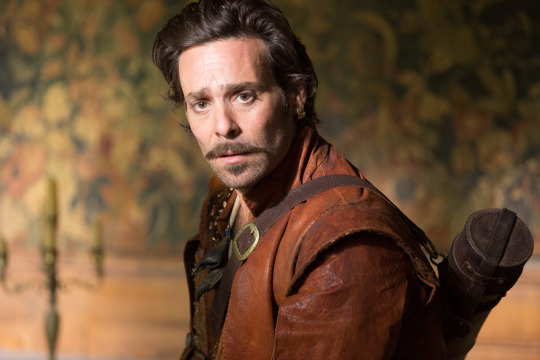
Émile Bonnaire. Adventurer, mercantile traveller, ladies’ man. Likes a drink, likes a laugh, loves to tell tall tales. Flamboyant, fun, and impressively fleshed out by the tiny, dapper, gravel-voiced charms of James Callis. Even his name derives from the French for “a good time” (or, depending where you look: “good bloodline”).
We first meet him accompanied by jaunty music on his way from the docks to a tavern, tipping his hat to interested women with a smirking flash of big, dark, pretty eyes, before roaring his intentions to pay for everyone’s drinks as he bursts through the door.
A bit of a rogue, Bonnaire. A bit of a weasel too, but a funny one. And he has an excellently aggressive wife.
Bonnaire is the kind of person who gets other people into trouble but always slips free himself. Pay attention - that’s going to be important later.
Once he’s successfully wriggled his way back into the clutches of the Musketeers, he treats Porthos (and us) to the glories of his exotic wanderings, revealing himself to be something of a liar, or just prone to exaggeration and fawning.

So far, so funny.
Except that the people he’s pissed-off have a habit of finding him, and again it’s those around him who pay the price. Our lads drag a potentially mortally wounded Porthos on to Athos’s old house and, despite comedy punching, it’s clear that things have taken a turn for the serious. The music is cluing us in, you see.
And it turns out that being beholden, duty, debts owed, and notions of family and belonging are massive themes here. As well as definitions of humanity, of who gets to be chattel. Of who gets to own the enacted tragedy.
Porthos rails and growls, and Bonnaire defends himself, claiming that the barbaric (“disgusting” - thanks, Athos) acts he’s perpetrating in the name of profit are “strictly business”. Not prejudice. Porthos spells it out for us, time and again: people are not belongings, everyone is free, no man has a right to own and dispose of another living soul. Except Bonnaire is. Except Athos has. Except the King and Richelieu do, and will. Arguably, these men who kill for duty, as Maria Bonnaire threatens for love (and is killed for revenge) are part of that same culture of disposable humanity.
The episode shows us this, asks us to consider a multi-faceted view of people and their motives and actions. People can be noble and be murderers. People can be friendly and polite, and ruthless killers. People can be charming and fun and human traffickers.
We have a problem in this fandom. A pretty big one, and frankly an old one too. Dumas, for example, seemed to be showing us an unredeemably monstrous Milady while simultaneously demonstrating that, in the society where she found herself, she had little choice - drown, or by killed for a witch, essentially. Tragic, noble, beautiful Athos drowns his sorrows under a nom de guerre, and charges at well-armed enemies in a bid to escape from a crime that d’Artagnan labels correctly as murder right from the get-go in the books. And in the show, Athos condemns Milady over and over for the sins that he himself commits, of killing at the command of the powers-that-be, forever drawn to and repulsed by a woman who shows him all-too-clearly what they both are, and have chosen to be. And yet certain facets of fandom cannot see Milady as anything but evil, and Athos as thoroughly blameless. So many adaptations (or perceptions of them) see Richelieu as nothing but a big old panto baddie and d’Artagnan as a beloved puppy who never did anything wrong. Hi. We have some things we need to address. Dumas gave us a raft of characters who are frankly horrible, selfish, violent people, every one of them flawed in some way, every one of them with issues they need to face, sins to atone for. We do the source material an injustice if we reduce them to simply Good Guys and Bad Guys.

And here, in response to an adaptation deliberately rendered for a modern audience, with dozens of layers in every interlocking scene and arc, people persist in seeing Bonnaire as a funny wee guy who was merely a bit greedy. But he’s funny and flash, so no real harm done, huh? Oh, he’s misguided, not evil!
The late, great Terry Pratchett broke down millennia of debate by saying that evil starts by treating people as things. Oh, it may head elsewhere, become more granular and a matter of opinion, but actually it’s pretty simple: don’t treat people as commodities.

The people who watch that episode and come away uncritical Bonnaire stans stagger me. This one isn’t even subtle - not only does he leave his beloved wife to die; not only does he lie and cheat and slide away from accountability at every turn, but Porthos roars (and later mutters) an absolute and no-holds-barred, emotional and intellectual take-down of the ethical nadir, the moral pit that is perpetrating slavery. He outlines in pitiless detail what it really means to the individuals (“Men, women, and children!”). He show how the long-term effects of that abuse, even once freed, shorten a person’s life, have resounding repercussions through generations. And he must feel so alone - the others holding him back from hurting Bonnaire, Athos telling him “Yes, it’s horrible, but it’s legal, and we have our duty to take this man to the Cardinal,” before ducking out of said duty himself to go on an drinking binge epic even by his standards. The others are more sympathetic, but still follow the course set for them by their superiors.
I want to tell the Bonnaire fans: yeah, he’s supposed to be fun and funny. You’re supposed to pick up that people can be interesting and quirky and ABSOLUTELY, THOUGHTLESSLY EVIL. That evil isn’t just the simple, unattractive thuggery of Labarge et al, it’s men doing ruthless things for the good of their country or for profit or for love or for power. It’s people feeling desperate and it’s people feeling dutiful. It’s not any one thing (except, at root, commoditising people), and just because they sold the role, doesn’t mean that the actor didn’t understand that either.
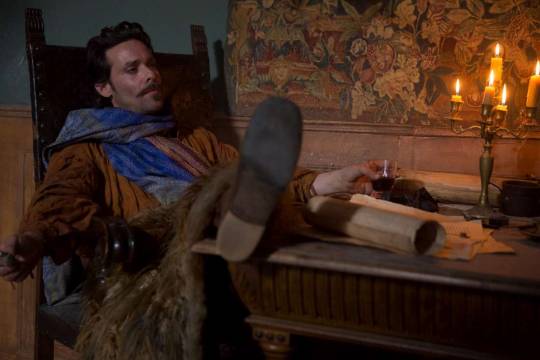
This is the message that I want them to understand: evil can look pretty. Evil can be charming. Evil can seem absolutely harmless. Evil can make you laugh, feel flattered, feel affection, feel pity. Yes, there are moral grey areas in the world, but human trafficking is not, cannot, and will never be anything other than irredeemable savagery. Slavery is cruel and vile and inhumane. And just because something has never been condemned in law, does not mean it is justifiable if it diminishes lives.
And just because you find someone attractive does not mean they’re the good guy. Come on, now.
#the musketeers#bbc musketeers#bbc the musketeers#musketeers#the three musketeers#season 1#episode 3#commodities#emile bonnaire#Émile Bonnaire#bonnaire#james callis#porthos#athos#d'artagnan#aramis#long post#oc#essay#media literacy#image#image description#image description in alt text#animated gifs#slavery#human trafficking#problematic characters#historical drama#meta
115 notes
·
View notes
Note
I've read avengers inc. #5 so I can be an informed hater and while the issue was Bad (why did all of that happen in janet's book with her narrating the moment hank met nadia? why did he already know of her? the whole thing was underwhelming), I can see ewing writing a good hank with a little more research. The comment about hank and nadia being geniuses who are driven to the point of destruction annoyed me because I can see what's being said but what did nadia even do that warranted that? have a manic episode? but since it's janet saying it, I'm not too upset. I know jerwhit wrote her as mental health ally #1 but she was consistently not great about her husband's mental illnesses & there's no point in getting rid of that part of her character, I think, without actually addressing it. Other than that comment, though, hank wasn't the worst-written character in that book and I reluctantly found myself a little interested in what ewing's take on him would be if he were to write him again. What do you think?
He wrote a good Hank in his Ant-Man series (imo), so the strange characterisation of Hank was just odd. Like, yes we're having a different time tonally than 60s Ant-Man–but he is ultimately the same person at the end of the day, and the characterisation mixed with the art did feel very MCU-lite. I do agree that I think he could do better by Hank, he just needs to. leave Janet alone because holy hell he cannot write that woman. He has done better by Hank. I just generally think that this series was not his best work at all, like even his Vision, who's writing I loved in Ultron Forever, did not feel right and felt disjointed and out of character.
And yeah Nadia has never really been "driven to destruction" in the same way that's at all comparable, and certainly not in the same way that affected Janet specifically, so it's a bit weird of a line, but as you say, Janet has historically not been great around mentally ill people, not just with Hank but with Wanda Maximoff too, which I think is a more interesting personality trait than "patient to a fault Step-mother for Nadia" but writers are allergic to Janet being flawed in an interesting and realistic way so I guess we're stuck like this.
Anyway. I do think there's hope for a good Hank under Ewing, he just–needs to not include Janet until he can understand her core personality traits, that she's 1) someone who is determined to enjoy life and to enjoy herself, 2) that she's passionate specifically about being an Avenger, that she loves being on that team, working with other people, having that group dynamic and is not terribly interested in working solo, 3) is not good with feelings. She often says the wrong thing or can come off as incredibly dismissive. She tries her best, and does employ a more gentle persona around the people she loves, but she does not think before she speaks largely and can upset people often. 4) Is a massive control freak. She does not trust enough people other than herself to do certain jobs right and prefers to do them herself, even if her help might not be needed or appreciated. She doesn't stop to ask for another opinion, she's confident in her own ability to go ahead and do it, even when it comes to incredibly important decisions in other people's lives. She's an incredibly nuanced, complex character, who's as much a flighty fashion designer as she is someone who needs some amount of control in every facet of her life as an adult. Ewing's Janet just has been extremely frustrating to read and I'm annoyed his lack of understanding for her dragged down Nadia and Hank's first interaction and made everything feel odd.
#asks#anonymous#avengers inc.#avengers inc. spoilers#do i want to tag this with them? i feel someone's gonna yell at me#hank pym#ch: the wonderfully winsome wasp#nadia van dyne#nadia pym
15 notes
·
View notes
Note
Not trying to defend Rowling or Snape, but I do think it should be said that Rowling has outright stated that Snape isn't really a good person on a personal level. But that he was also instrumental in stopping Voldemort personally regardless, and it seems to me (after digging out my ancient copies of the books) that he didn't really buy into the whole "wizard superiority" nonsense for too long, but by the time he realized it wasn't really what he wanted it was far too late to just not be a part of it without risking his own life.
And he still did go out of his way to go against them, even after Lily died. I think he probably would have gone against them just as fiercely if Neville had been the chosen one, if only out of revenge and penance for what happened to her (which he was partially responsible for).
The situation in the books at least actually rather parallels indoctrination of minors into these supremacist groups IRL; Snape only got into it because he was a social outcast and was easily convinced because he was constantly mistreated by his peers. Ironically, he was a half-blood wizard himself. They only had him join their ranks because he was really good at making potions and had the ire for others necessary to use dark magic.
I need to clarify again, I'm not really a fan of Snape period, but Lily once again misses the entire point of him. She sounds like one of the mega Snape fangirls from back in the day.
If she wants him to be a better person, she could probably do it without downplaying the shit he was involved with.
"if only out of revenge and penance for what happened to her (which he was partially responsible for)."
that part right there is why i have a problem with how snap was written. if the only scenario where you can imagine him changing sides and actively working to try to take down magic fascist leader is one where his love interest gets punished for it, then i can't really believe that he has any real convictions of his own. if harry's mom was never affected by the war, if she got to live a long and normal life with her family, would snape still change? or he would stay there where just has to do enough to keep himself alive? because what is me, i can't picture him doing anything like that.
about rowing herself and her words... those words really don't mean much when she was the one who decided to immortalize snape as the "bravest man i have known" by naming one of harry's child as him. this is the biggest point of conflict in the fandom regarding snape that i have seen. that on one hand rowing tell us that he is not that good of a person and was flawed, but at the same time fully endorse snape being rewarded even better than many other characters who were never nazis, never abused any children and were also fundamental during the war.
when in text all he did was not say a slur after his love interest says it was a bad word and tell harry his life story at the last second. he never had to make amends, he never had to show anyone his change, he never had to compensate for the harm he had done. he just dies. on itself this is fine but it's ruined by the ending. i don't mind snape existing by himself, but he did not deserve that kind of tribute to be part of the last words we'd ever see about the story. for a better example of someone who is not a perfectly good person, but does tries to do good and legitimately tries to do better because they believe is the right thing, sirius black was right there. he was full of flaws and he still tried, for better or for worse, not because of someone but because that's what he believed.
i can see why people like him and i might even understand why LO does too. but the fact remains that he wasn't just a good or bad guy, that he could have been written better, and you need to talk about all of his facets, including the magic nazism and abusive tendencies, instead of pretending they weren't a big deal or don't exist at all, if you even attempt to look at this franchise critically.
8 notes
·
View notes
Text
Umireread: Turn of the Golden Witch - Chapter 8: Wedding Ring
Sat, Oct 4 1986 - 10:00PM
The following contains spoilers for the entirety of Umineko. Please do not read if you are yet to finish it.

I know this isn’t the first time that Santa has been brought up in relation to fantasy vs reality, but it is a pretty apt comparison for the message of the story. No-one ever says that it’s cruel or immoral to lie to kids about there being a magical man who delivers presents around the world. If it wasn’t for the fact that they have to learn the truth eventually - since they’ll need to help perpetuate it for the next generation - would it be better if they spent their entire life believing it?
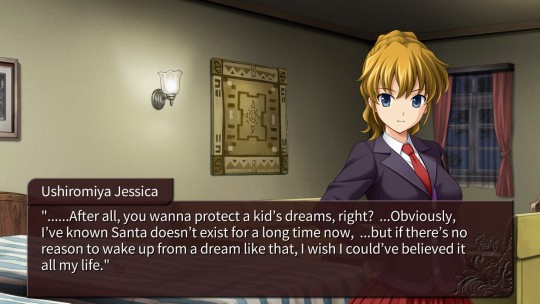
Case in point.

It’s interesting how much time they’re devoting to setting up devil proofs here - priming us for the introduction of the Red Truth and showing how many issues we’d have trying to solve the story without it.

Come on Ryukishi, you can’t just say “wow! I’d love to read a story about a child seeking revenge!” in your story about a child seeking revenge.

Episodes 1 and 2 dwelling so hard with the incorrect axiom of “the killer doesn’t want to be caught” really torpedoes the arguments that the characters are able to come up with. By now, it should be pretty reasonable to figure out that the killer wants to be caught - and that they want the Epitaph to be solved. But why? Is it possible to even construct a plausible theory for that at this point?

This scene is just oozing in the overall truth, isn’t it?

Very funny to see that “human woman” is in bold here, but not “single”. Don’t want to make the regular accomplices and the resulting roulette too obvious now. I’m sure Yasu is pleased to be perceived as a human woman, though.

You know, I’ll have to see how much this facet of Maria’s personality remains in the Tohya Forgeries, because this really isn’t doing it for me - and I’m wondering how much of it is down to this being Maria’s actual personality, and how much of it is down to Yasu focusing on that element of her.
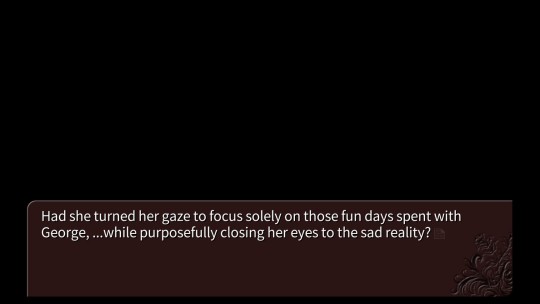
No comment necessary.
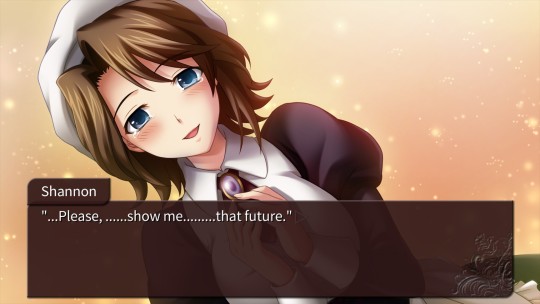
Echoing my former comments on how, regardless of how their relationship formed, you can’t deny how much it means to her.
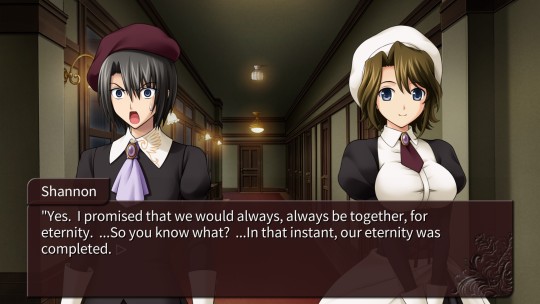
Shannon’s use of ずっとずっと here made my ears prick up - admittedly due to the immense amount of times that I’ve listened to Revelations. While it’s definitely too much of a stretch to link these together, I do find it interesting how the phrase is used here for “always, always” yet in Revelations it’s used as “again and again”. Of course, the latter translation is meaningless nonsense if you think of a single gameboard - but if you think about it over the wider Sea of Fragments?
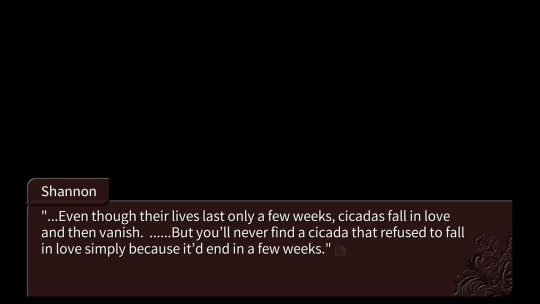
This is really interesting to compare to the philosophical discussion of the life of the wilting rose in Episode 1 - all the cousins talk about their thoughts on seeing the rose, being glad they could see them when they bloomed, but here Yasu is the one considering not how she feels about the Cicadas, but how they feel themselves. And isn’t that the actual important part of it all?

Okay - so this was going to happen eventually, but now is as good a time as any. Allow me to chime in on Umineko’s central theme of “love” as an asexual person.
I’ve alluded to how you can interpret Umineko as a criticism of heteronormativity before, but even at the core, Umineko is intrinsically connected with the base human instinct of love. I’d go as far to say that Ryukishi (at least, at the time of writing) wasn’t really aware of asexuality, and just assumed that experiencing love was a base part of the human condition that everyone experienced. Mildly amusing if so, since it means he too has fallen victim to building arguments on flawed axioms, while writing an entire tale about that very issue.
However, even as an asexual… I don’t mind this. I don’t feel seen by Umineko, but there’s a key component to how Umineko has been written that stops it from being entirely unrelatable: while Umineko dwells in romantic and sexual love, Ryukishi is writing with unrestrained love towards his fellow human beings. He’s writing with love towards the world he was born into. The world that we were born into. While he may not have done so intentionally, platonic love oozes from his work.
That’s why I can still resonate with the central message. Maybe I don’t love anyone in the way that Ryukishi expects I should. Maybe my body, too, is effectively furniture. But even still, I can love my fellow human for existing. I can love the joys that we can experience because we are alive. I can say thank you for being born - not just to others, but to myself. I can relate to that. And, honestly - I think everyone can. Maybe romantic love isn’t something that everyone can or will experience. But a general love to the world around them? I do think that might indeed be a universal part of the human experience.
…I’d love to leave this little aside there, wrapped up nicely in a bow, but I did have a bit of a gut punch at the “maybe I too am furniture” note - because, yeah, in hindsight, that might be directly aphobic. That might be the line that’s devalidating to asexuals. But, again, I don’t personally have a problem with that, because that concept is directly stated to be Yasu’s line of thinking - not a view that finds itself entirely endorsed or condemned by the narrative. Because it’s just what she thinks - and it’s up to you to decide how you want to feel about that. Yasu is hurting, her beliefs come from a place of trauma - I don’t feel invalidated by that. I just want the person who believes that to become better, to heal. I want to be able to love the human who lies behind that layer of unmitigated despair and agony. And, again, isn’t that ability to understand what Umineko is about?
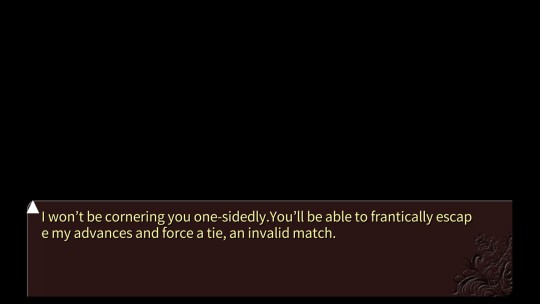
Once again, moving swiftly on from a deep dive to a more regular point of analysis. The concept of a “tie” in Beato’s game is an interesting remark - because how would that happen? Of course, with full knowledge, this is a board state where Yasu is caught and apprehended (all it takes is a lucky shot from one of the guns), but the Epitaph is not solved and the bombs still go off. But, if you don’t know that, how does a tie work in this game? You catch the culprit or you don’t. So this is a pretty strong hint towards Beato having a failsafe.
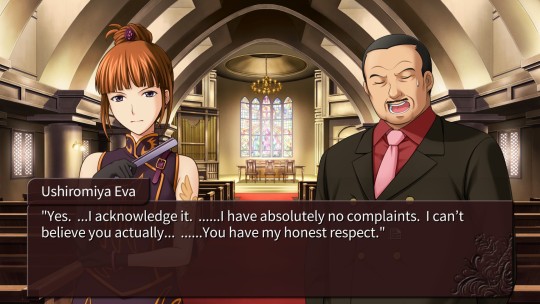
This is one of those scenes where I’m deeply curious about what’s going on behind the scenes. How much did Yasu reveal to the adults here? We know the chapel is connected to the secret room, so it’s very possible that she straight up showed them all the gold.
Actually, thinking about it, there’s an alternate solution for the First Twilight here, isn’t there? You could actually Red Truth that the door was locked, since we could have got in/out via the underground passage to Kuwadorian. Although of course, that doesn’t play nicely with Knox, even if we allude to the presence of a secret passage with the code in the chapel.

I’m going to be honest, I don’t actually remember them doing Role Calls after Episode 1. The first one stuck out to me a lot, but I guess the repeats didn’t leave as much of an impression.
No Kumasawa, Shannon, or Nanjo this time. Very interesting - we already know that the Role Calls are untrustworthy since we have Kinzo in the study, but even if you wanted to say “but that’s just his body”, we have Kanon in the corridor and Beato in the VIP room, so that’s an impossibility there. I’m going to rescind my Episode 1 remark about the missing people being those who are sleeping, and just flat out say that I don’t have any reasonable conjecture on why the people who aren’t in the Role Call are absent from it. Natsuhi’s absence in the first Episode torpedoes the idea of it being accomplices. Could not give you a single theory that connects these missing pieces together.
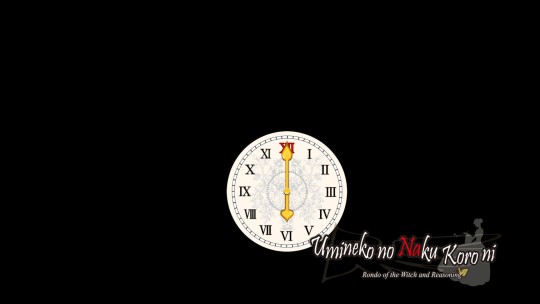
And time for the First Twilight… for the second time.
3 notes
·
View notes
Text
Anonymous sailor sent a message in a bottle. . .
(I HAVE RETURNED AND AM HERE TO STEAL HORATIO! HAND HIM OVER AND NONE SHALL BE HARMED!) Does Flameheart care at all about his Ashen Lords or are they just another tool in his plan? Also, what did Flameheart see in each of the Ashen Lords that made them appealing for him to hire as his Generals?

Nooo don't kidnap the Commander, the skellies need him
So, it is a bit complicated when it comes to Flameheart with the Ashen Lords. On one hand, he does deeply trust them -- enough that with how controlling the skellie man is he relinquished some of the armada to be commanded by all four. He trusted them enough to claim the ancient Ashen Curse and wield it -- well, he did end up manipulating it so they can never betray him, but that is also a shred of paranoia with how powerful that curse can be -- and for them not to outright betray him. He entrusted them with his plans, his gut feeling that he was going to die and tell them of his plan. Flameheart can be more casual and more of himself than the intimidating and powerful Pirate King around the Lords. However, Flameheart is a selfish man at "heart". He fully refers to the Ashen Lords as "his weapons", that they are another facet of his power and arsenal. Tools for him to use to claim the Sea -- although ones that he is a bit more attached to than the other tools he has.
As for what he saw in each of them for why he brought them in: Ruth - she was found out by the rumors of a pirate with wild ideas that could change the way fights happened in the Sea. When the skellies mentioned a pirate throwing fire at them, Flameheart had to check it out -- only to find said pirate left on an island by herself and seething with rage. He was impressed with the ideas she had created such as the firebomb, and got even more so when she had pointed out a flaw in one of his plans without even being intimidated to do so. Grimm - he had a bit of a unique case, considering that he is the younger sibling of Duchess. When Duchess found out her little brother had escaped their family and sailed into the Sea, she suggested him to Flameheart. What made Flameheart decide he fit into the position of General when Grimm gave some rather good suggestions on the creation of the Fortresses and the Heart of Fire. Horatio - he was one given an offer after nearly getting in a fight with Flameheart. As I mentioned he was once a Navy officer for the Grand Maritime Union, sent in on a mission against the pirates on the Sea. However, he ended up disliking the lack of honor the Maritime Union had when it came to dealing with the pirates. He was very convincing to rally the forces behind him, and also had deep knowledge of ships. Such was an interest to Flameheart, and he offered the man a spot as a General for his armada. Chi - they were a bit of a spur of the moment decision. Flameheart wanted to go for another on the new ship to the Sea, but discovered somebody who was going toe to toe with one of his Generals when they had no experience in fighting pirates. Flameheart did see the cruelty in the merchant auditor, and decided to take a chance on them. It was a bit later that he decided that Chi would be the Warden, and added on them being the assassin and one to track down slippery pirates when they showed their abilities finding and torturing the hell out of a Gold Hoarder.
#anonymous#ᴀꜱʜᴇɴ ʙᴏᴛᴛʟᴇꜱ ᴡᴀꜱʜᴇᴅ ᴛᴏ ꜱʜᴏʀᴇ ✦ answered#ᴛʜᴇ ᴀꜱʜᴇɴ ʟᴏʀᴅꜱ ꜱʜᴀʟʟ ʀɪꜱᴇ ᴀɴᴅ ʏᴏᴜ ᴡɪʟʟ ʙᴏᴡ ✦ ashen lore
1 note
·
View note
Text
listen, i'm not trying to pick a fight here, but i do feel the need to respond because i feel like there is a bit of a misconception about me going on here-
for the record, i do actually dislike jack drake on a lot of levels & i'm not trying to give him a characterization he doesn't deserve as some sort of uber feminist hero or defend him or anything. in fact, i do think he's quite sexist & a large chunk of my brand is actually specifically trying to suss out the complexity of janet, janet's marriage to jack and how he was probably terrible to her, fanon's response to janet & the misogyny she faces as a mother character. i mean. i am also interested in jack as a flawed and terrible person (and sometimes like to make funnies about him) because i also do like to think about him as a complex person since i like to think about tim's complex relationship with his parents and upbringing and the complex facets of the drake family unit as a whole. but definitely less him than janet, who i'm very frequently trying to explore as a character and the multitude of possibilities and explanations for her and why i decided to start writing fic for her that's sympathetic to her.
i do think your read has merit and you can absolutely read it that way, but i will point out that i really don't think the panel in question indicates that janet thinks that suddenly has found out that her husband is a terrible person who doesn't truly believe in ideas women's liberation

he makes a gently sexist comment that he (admittedly, half heartedly) then apologizes for when she calls him out & rather than brush aside her concerns further goes to find some people to take a picture with in respect to calming her worries. in fact, her teasingly prodding him that him making a sexist comment when he's supposed to be "liberated" (which is very, very specific terminology to use in the year of 1989 flashing back to the late 70s/early 80s & the writers would have been aware of what "liberated" explicitly meant in this time era context to use for this), and the overall tone of this panel to me, at least, indicates that him making a sexist comment is actually contrary to what janet has experienced his usual behavior and ideas to be thus far in their marriage (which at this point they are in their late 20s/early 30s given jack was like 43 when tim died and he's 3-5 years old meaning they've been married at least that long and i doubt janet, who appears to be a feminist, would actually think he's supposed to be liberated in the 1970s without him expressing some form of support for it at some point in those previous years). which would me that historically in their conversations jack would have likely expressed support for the things that "liberated" meant at that specific time period such as all the things i listed. and, clearly, he's very okay with women working giving that *both* of his wives have been working women with minimal fuss, and he's okay with the idea of janet being a working mother given she's a co-CEO of his company and she travels frequently with him to work rather than jack expecting her in a traditional stay at home mom role. this is very much in line with a man who, like i said, at least seems to *nominally* support the idea of women's rights, especially in time era context, even if he doesn't actually espouse them completely himself.
now this doesn't mean he's not also a huge sexist. lots of sexist men support the idea of women working. lots of sexist men support a woman's right to an abortion. this is what i meant when i said he's a man of multitudes--he can very well at least pay lip service and somewhat believe and say "yea, i agree with women's rights those are good of course" and *still* also very much uphold sexist ideas in his personal life. in fact, i touched on this in my original tags where i say that tim would have grown up in a house where women's rights were respected while his dad disrespected the individual women in his life regardless.
and, like, i am a champion for the idea that jack's sexism and refusal to truly see women as equal ultimately probably played a role in the dissolution of the drakes' marriage due to jack and janet's ultimately diverging viewpoints and beliefs and jack's inability to truly believe his wife could be equal to him. but all i'm trying to say is that more than likely, imo, the jack in alpod, early in his marriage to jack is also a jack that is at least somewhat implied, along with janet, to believe in the ideas of women's liberation of the time frame. he is often cast as a total social conservative, but, more likely that not, if you had asked him "should women be able to work, have their own credit, etc" he'd be like "yea, of course". he might not be able to truly believe in it, but he probably wasn't against those ideals, likely supported them in conversation with janet, and wasn't out there railing against them. it doesn't mean he's not also sexist. because he definitely is. idk i guess to me my choice of the word support was not meant to mean he's a total feminist. just that if you had asked him, in the 1970s, whether or not women should have the right to work and own their own credit. he would have said yes to those things & meant it. he's just also incapable of truly respecting his own wife at the same time.
like. jack drake is so very, very republican. but also. in the alpod flashback that nebulously takes place 8-10 years prior to alpod in 1989, when janet says to jack "sexism, dear? and here i thought you were liberated" it is directly implying that jack was, despite his sexism, a supporter of the women's liberation movement. jack drake was nominally a supporter of women's rights to work, have their own credit, get abortions, etc. i mean. he was also sexist too, but. he is a man of multitudes. please understand this.
#sorry i'm really not trying to fight#just trying to explain myself more.#i am actually hugely passionate about janet as a complex human being so i gotta lol#and i do think you can read it as janet mistakenly assuming he was liberated when he wasn't#but idk i do think that janet. who is implied with this to be a feminist would have had conversations about this with her husband#and know what his opinions on women's liberation in the 70s were#hence the “why are you being sexist when you claim to believe in women's liberation” in the late 1970s setting#he would have had to at some point say he believed in it. i think.
104 notes
·
View notes
Text
Han Joo Won loves a love triangle, Part I
Let's talk about Han Joo Won, his jealousy and his weird attempts at creating love triangles.
[Excuse this post and all its flaws: it was written during a stupid, stupid English heatwave... otherwise known as satan's asscrack. No, this tiny cold island shouldn't be 33C at 9am. ]
Also, I must add that I barely got my English GCSE at school. So, to all those English majors or people with a higher qualification in English Literature (etc), I have no horse in this race. I am not pretending to know what I am talking about... Just indulge me, please.
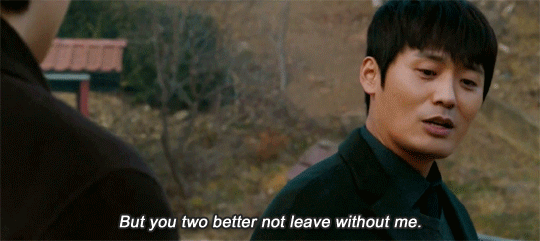
We all know that Han Joo Won is a silly, silly man. He is pompous and proud, blunt and rude, emotional and caring; he picks fights, gets dissed, and then needs 5-10 business days to think of a comeback.
He also doesn't like close emotional relationships. He believes relationships should be on a transactional (give and take) basis; no emotions, no complication, just favours and debts that get paid off. Han Joo Won has also canonically never had a romantic relationship.
Joo Won clearly has some emotional issues that stem from childhood trauma. He struggles with making genuine, long-lasting connections (mainly because he doesn't want them) and doesn't seem to understand the value of creating bonds. He's a very lonely person, who doesn't know that they're lonely. He reminds me quite a lot of Mr Darcy from Pride and Prejudice. Both share some character traits and act as "misunderstood antagonists" in their own stories, only to become one of the protagonist's greatest allies (and romantic interest). [they're both totally autistic/have asd but whatevs]

[This is written about Mr Darcy. But if someone told me it was a summary of Joo Won, I would totally believe it]
Obviously, the basic plots of Pride and Prejudice and Beyond Evil do differ: one is about the sociopolitical inequalities of regency England's marriage system and how that conflicts with love, and the other is about the importance of found family and love in a corrupt society, overcoming trauma and that no one is above the law. However, they do share similar themes:
Reputation
Class
Family
Preconceived assumptions
Love
Integrity
Han Joo Won and Mr Darcy are (at first) both hard to get along with. Their arrogance and snobby attitudes rub people up the wrong way, and they are often excused for their behaviour because of the family's class and financial status. Where these two characters differ the most is the lens through which they are explored. By this, I mean that Mr Darcy is explored through Elizabeth's pov, and only when her perspective of him changes so does the audience's. Whereas Joo Won has his own pov, he is one of the main narrators of his story. Our perspective of him only chances once he is willing to show his other facets (because Dong Sik forces him to).

[HJW and MD are both misunderstood, socially inept rain-soaked kitty cats, who do use/would use the word ardently when describing their feelings]
[Quick note: Dong Sik is so Elizabeth Bennet. Crazy pretty, comes from a family of "lower" economic class, is from a loving family, charismatic with a sharp tongue, witty, sarcastic, has a love of the ridiculous, stubborn, and has a bit of a temper. Come on, this quote said by Elizabeth could easily have been said by Dong Sik: “There is a stubbornness about me that never can bear to be frightened at the will of others. My courage always rises at every attempt to intimidate me.” Pride and Prejudice, chapter 31]
Another similarity between Han Joo Won and Mr Darcy is that at one point or another, they find themselves in a short-lived love triangle. The biggest difference is that Mr Darcy did not choose to be in a love triangle, Han Joo Won did.
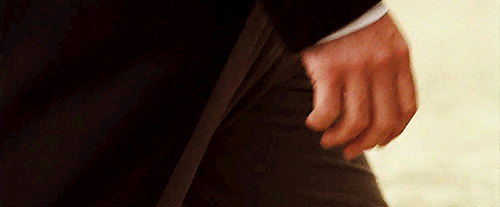
[Joo Won has his own hand flex scene]
When Han Joo Won arrives in Manyang, he is there with a purpose and that purpose is to catch his murder suspect: Lee Dong Sik. There is some stalking history but that's another point for another time. Han Joo Won seems to be taken aback by how much Dong Sik's community love him: he has a large friendship circle and is respected and supported. From very early on, Joo Won seems to be interested in the idea that Dong Sik has a girlfriend. Which could speak on Joo Won's societal beliefs. Perhaps, he's been brought up to believe that a man in his forties should or at the very least, would, have a girlfriend or wife. Perhaps, he believes that Dong Sik would have a wife- maybe it helps Joo Won add more detail to his murder suspect's MO. Or perhaps, it's because Joo Won needs Dong Sik to be interested and involved with women because if he wasn't then... maybe he's interested in men, maybe he'll be interested in Joo Won, maybe he'll find Joo Won attractive, what if Joo Won reciprocated those feelings, what if-
It's easier for Joo Won if Dong Sik is straight.
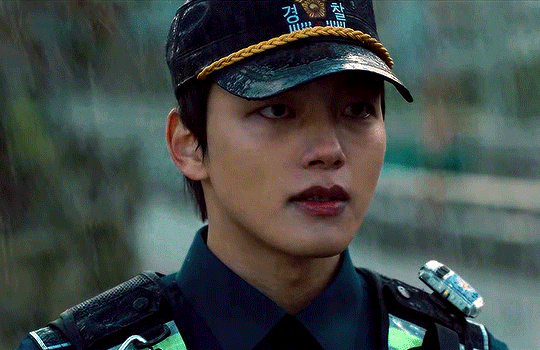
Beyond Evil uses the rule of three when exploring Joo Won's jealousy. [Definition: "The rule (or power) of three is an age-old writing technique that implies that things that come in threes are inherently more satisfying and effective to readers." - www.andbeyond.com]
So, who's the first person Joo Won believes Dong Sik is interested in? Kang Min Jeong.
I'm not even sure if this suspicion lasts for an entire episode. But Joo Won is so bitchy about it, so princess, that Ji Hoon had to sit him down and say you're being really obvious, calm down, damnnnn she's like his daughter. So, once that "potential love interest/rival" is ruled out, Joo Won moves quickly on. The second rule of the three, the next suspect: Oh Ji Hwa
Now, this is where Joo Won's jealously really shines through. It's text, it's obvious, it's right there for everyone to see. Episode 5 is where this jealously is most prevalent for the audience to see. [quick context filler] At the beginning of the episode, Joo Won wanted to know who Dong Sik is protecting. They have a big UST row over it and Joo Won left with all this information and not context (cause he's too silly to connect the dots). At the police station, the Mayang police gang protect Joo Won against the harassment of the reporter... and he... well... He asks: “Why do you care about me? You barely know anything about me." That's some of the sad shit right there. It just highlights Joo Won's complete lack of understanding of how feelings (like attraction, affection, love) work. He doesn’t understand that they aren’t something earnt, they aren’t given with permission, you cannot control how someone feels about you. It ALSO shows Joo Won's panic of "oh, now I owe these people". The conversation that follows is (I think) one of the most important in the show because it outlines one of the fundamental factors of Dong Sik's and Joo Won’s dynamic. Dong Sik tells Joo Won that “we'' protect our own here, even if we are mad at each other. The people of Manjang band together to eliminate any external threats. And WHAT HAPPENS THROUGHOUT THE STORY??
DS & JW band together to protect a disabled boy against the weather
When bringing Kang Jin Mook to justice
They (reluctantly at first) unite to find out who kills KJM
They start their own task force to investigate who killed the Chief
They band together to find out who killed Lee Yu Yeon
They band together to arrest Joo Won’s father
Whenever there is an outside threat to their community, their safety, their happiness, and their relationship, these two always band together to protect and fight off the threat. No matter the sacrifice, they will protect each other and anyone else who deserves it. That is so beautiful. They are at their best when they are a unit. But anyway, within the context of the scene, Dong Sik is really saying: “I’m still mad at you for the shit you’ve been pulling recently. But don't you see that we are all just normal people? I'm not who you think I am. So, just stop the charade and be a part of our community."
But at this point in the story, episode 5, Joo Won doesn't trust Dong Sik but he is interested in him. What he also doesn't realise is that after the whole "don't be mean to HJW. He's an idiot but he's our idiot" scene, Dong Sik alongside everyone else. He has just protected Joo Won, adding him to the list he recited at the beginning of the episode.
Then... plot happens and they go beat people up together because they're bonding... it's also because Joo Won cares for Dong Sik AND it's because Dong Sik protected him, and Joo Won has paid back the debt.

[from the moment I saw this bit, I thought it was an erection joke and I've got smh at myself sometimes]
But what happens afterwards is what is most telling.
Whilst the officers are processing the charges, Lee Chang Jin makes everyone aware that he and Ji Hwa used to be married. In a thinly-veiled attempt to make others feel sorry that he’s no longer with “his love”, Dong Sik gets angry on her behalf. Ji Hwa is one of Dong Sik’s closest friends, they have always had a platonic relationship, and they love each other dearly. Dong Sik doesn’t like his friend’s shitty ex-husband spurting lies.
So, he kicks the desk.
Joo Won’s reaction? A small amount of confusion mixed with surprise and a sad sigh as he looks away.

What does this look like to Joo Won? He thinks Dong Sik is jealous. He thinks the guy he likes is jealous of (if this were a normal het drama, Dong Sik and Ji Hwa would have been a couple and Joo Won and Jae Yi would have ended up together) Lee Chang Jin’s history with Ji Hwa. Perhaps, his feelings got hurt so he wants to push the “straight” man he likes away, in order to protect himself. Concealing. Concealing. Concealing.
So, what does he actually do?
Gets jealous and pisses Dong Sik off by being a jealous brat.
As we enter the following scene with jwds, the shot we see is of Joo Won sitting up straight with his arms crossed in front of himself. He seems to be annoyed and deep in thought. This could be because of a video of him beating people up is online, it could be because he knows his father knows, it could be because he’s worried he’ll get into trouble. But what is the first thing out of his mouth?

Are you jealous?
What a wonderful example of projecting. Dong Sik isn’t the jealous one. We know he isn’t because there hasn’t been a point in the show (for the 5 episodes, which are roughly an hour long each) that a romantic relationship (past or present) between Dong Sik and Ji Hwa has been mentioned. Instead, we have seen their friendship. The concept of jealousy comes directly from Joo Won and you can see how hurt/tired Dong Sik is once Joo Won accuses him of being jealous of his friend… his female friend’s ex-husband.

We’re at the halfway point of the episode, up until this point Dong Sik has been trying to pull Joo Won in by protecting him and just being nice. He finally thinks they’ve gotten somewhere and the brat says this?
All of this "Dong Sik having feelings for Ji Hwa" nonsense is best summed up Ji Hwa's reaction:

This is probably meant to be a funny line to help diffuse the tension for the audience. A “we know it's getting pretty gay in here but don’t worry, we’ve acknowledged it, it’s not like that, pls don't run away conservative audiences…” But in reality: She directs these two lines to Joo Won. Not her best friend, who is older and should know better than to let little upsets get between himself and his partner. No, she directs it to Joo Won. Almost as if she can see through him, all the way down to his silly jealousy. His reaction is so interesting to me because he immediately gets up and tries to leave; which could be seen as heterosexual disgust (the suggestion that he might “fall” for a man) but it's already been established that he’s the one who is jealous. So, is it disgust or is it concealment? [Also, I know when he gets up, in the world of television, he has to stay facing the camera, so we can see his face as he leaves. But the character of Joo Won always chooses to leave the interrogation room by squeezing behind Dong Sik (getting in his personal space again), instead of just walking to his right. That is rather amusing to me]
In episode 6, Joo Won brings up Ji Hwa one last time to determine Dong Sik's feelings. The reaction he gets is a sigh. By this point, Joo Won has finally gotten his head around the fact that Ji Hwa and Dong Sik aren't romantically interested in one another. Joo Won had ruled Ji Hwa out as a romantic interest/rival. This leads him to his next suspect: Park Jung Je. The last part of the rule of three.
-
I'm going to leave this there for now. I will write a part II at some point but don't expect it any time soon. This feels a little disorganised but we all know what I'm getting at. Thanks for reading.
Ta ta for now!
#beyond evil#jtbc beyond evil#beyond evil analysis#beyond evil meta commentary#jwds#han juwon#lee dongsik#joo won wants the romcom drama. so he created it himself. i respect that#i bet he read too much romantic literature growing up#he wants side burns and waist coats and VERY tight trousers#he wants to walk across his estate and have a yearly income that will mean he is a handsome suitor#although no one has been handsome enough to tempt him... until...
148 notes
·
View notes
Text
This ep of helluva boss was just SO GOOD in terms of propelling Blitzo's character developement forward, especially within the context of the world building of hazbin/heluva canon. Like how Blitzo and Stolas's personalities and their motivations impact their roles in the society they exist in, and by extention, the relationship between the two of them due to the inherent power imbalance of Stolas's status as a royal. Their character arcs both individually and together are shaping up to be extremely interesting! I'll start with a general analysis of both characters and go forward from there.

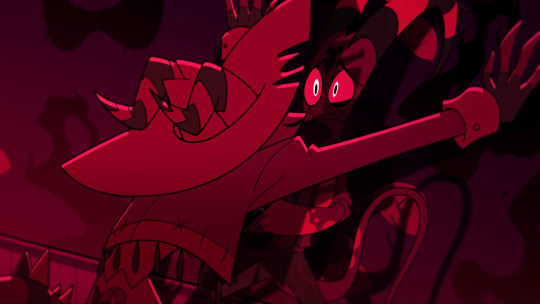
To start, Stolas is incredibly entitled and definetly suffers from a major superiority complex. It's an interesting contrast to Blitzo's inferiority complex, and to be honest, when you think about it they act as foils to one another in a lot of different respects. While Blitzo is prideful and an incredibly proud individual, there's an underlying note to a lot of his interactions that leaves you with the impression he has a lot of deep seated self-loathing and internalizations of his unloveability (i.e. ep two "does anyone love you blitzo?" "no."); Stolas by comparison, is self aggrandizing and portrays high self esteem and a secure sense of self and what his duty is even while he's in emotional distress (i.e. also in episode two with his lullaby to Octavia when he touches on his disillusionment with love! more on that bit in a sec)

From what I can speculate about Stolas given his portrayal on the show, he appears to be observably shackled to his sense of duty despite the lack of joy it brings him, however he WANTS LOVE. He DESIRES the thrill of that connection. His relationship with Blitzo goes against everything he built his life around (his marriage to Stella, his status as nobility, his responsibilities to safeguard his grimoire) but even despite this he can not help himself. I get the feeling that he may have impulse control issues or perhaps his willingness to just Risk It All speaks to the amount of infatuation he has for Blitzo??? because everytime they are in the same scene, he's just so incredibly elated and constantly vocalizing his desire for Blitzo's presence. He even goes as far to go out of his way to invite Blitzo to things, and introduce him to his daughter! A parent does not do those things lightly- to introduce your child and construct a situation where your 'partner' and your child socialize is a huge deal. On some level, he wants his two favorite people to interact and be introduced to one another, no matter how misguided that is. He did not consider Octavia's feelings or ask if it was what she wanted, only that he had positive memories at Lou Lou Land and he wanted to share that again- this is a show about hell but we've been shown time and time again the humanity and multitudes of emotional depth that the demons in this verse contain. His actions do not make him completely irreprehensible, but instead show that he does indeed have flaws and redeemable qualities despite our first impressions of him at first as a rich fuckboy, and then again as a dorky, well meaning dad with marital issues. His interactions with Blitzo and the other imps of the wrath ring once again recontextualize everything we know about Stolas as a viewer, and I have a feeling this is only the beginning.
Looking at Stolas's lines to Blitzo in episode 5 through the lense of Stolas being an incredibly lonely man (in a presumably, loveless on both sides and open, non-monogamous, arranged marriage), who craves intimacy on an emotional and physical level to the extent that he will extort his assets and risk every facet of his life so that he can have a continuous 'relationship' with someone, I don't think he was intentionally trying to degrade Blitzo (intentionally being the key word here). Which is not to belittle Blitzo's point of view of his experiences with Stolas, as he is totally entitled to how he feels and it stems from a completely valid place based on his socioeconomic standing as an individual in hell. Alternatively though, Stolas is someone born into privilege, therefore he doesn't see how his words come across and how they are percieved by someone in a lower social caste or someone who deals with systematic prejudice. Privilege is having the option to learn about what injustices people suffer because you don't experience them yourself, and that description fits Stolas to a T as it stands.
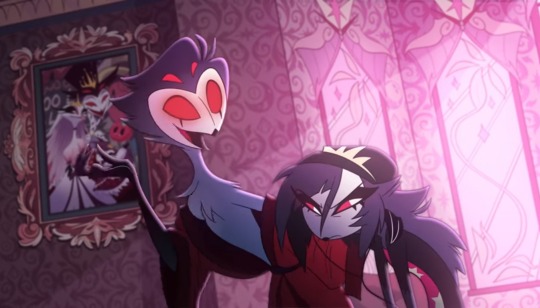

Stolas doesn't understand Blitzo's struggle, and that is the core of their miscommunication on the nature of their relationship. Blitzo won't allow himself to view the relationship as anything other than transactional for fear of getting his hopes up and being vulnerable by showing his hand in an emotional sense, and then being just another imp taken advantage of by someone higher up (if im reading this motif of imps vs the greater hell caste system right). Blitzo has had to fight tooth and nail for every success he's had, every achievement he's had thus far is hard won and it's so easy to diminish your own accomplishments when you're born into a society that makes you have to work 10x as hard as everyone else in order to be treated as an equal to others doing less and still achieving the same and more. To Stolas, his endearments and tendency towards physical affection is an expression of his fondness towards Blitzo, but he doesn't ever consider how those very same actions come across as demeaning/ belittling/ or acts of microagression that disregard his capability.

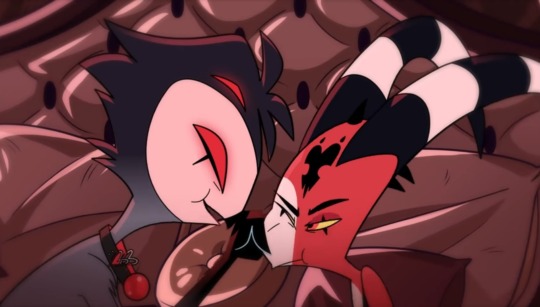

Tldr: im so fascinated by these two bastard demon menaces who have contrasting flavors of intimacy issues and can't wait to see what or who they do next???
2K notes
·
View notes
Text
There’s an interesting dichotomy in the way that Three Hopes expands on Claude’s character that I’m still chewing on, where giving him more room to breath and assert himself has simultaneously made me lose a great deal of respect for him as a leader, grow to slightly dislike him as a person, but also sympathize with his perspective and appreciate him much more as a character.
Three Houses always tried to tell us that Claude was a scheming trickster willing to hurt people to get what he wants- and there’s evidence of that in some scenes like Jeralts journal, but for the most part we’re largely exposed to his more sincere and kind side, and very little negative consequences of his plotting without reading between the lines of his motives
Three Hopes has in that regard done a fantastic job of correcting that and showing off his intended character flaws as advertised, with situations like the Gloucester Gambit, Naders subterfuge, and especially the two routes of Aillell sacrifice / betrayal.
We finally see a Claude that is making big, swingy, risky plays to achieve his goals with incredible strategic gains- and commensurate costs, often morally. Having to kill his brother, leaving his allies to die, staking a provinces’ reputation on a gamble, or dooming his nations status for a cheap powergrab and dying in the process all showcase the kind of ballsy and Machiavellian shit that Claude is willing to pull when he’s in charge of moving chess pieces on the board
And it also shows his detachment from the consequences and translating theory to reality, his unwillingness to trust others, and most importantly- the subtly selfish and prideful nature of his outwardly progressive ambitions.
The first and the last are where my disagreements with his politics lie, and the middle being the dramatic flaw that both gives him sympathy and prevents him from overcoming the others.
To get into what I mean by detachment from reality we only have to look at one example from each game to prove consistency; in Crimson Flower Hilda fights to the death, and Claude remarks heartbroken that she was supposed to retreat; a brief and simply painful reminder that he’s failed to take the human element into account during his planning.
Likewise in Golden Wildfire Aillell; Claude’s perfect plan to ensure that no Leicester troops die and the church is routed utterly disregards the humanity of the imperial allies he sacrifices, and even the empathy of those under his command who watched a good man die senselessly as he was betrayed and locked in a cage match with a legendary warrior during his retreat.
It takes a serious dressing-down from Shez afterwards to set him right, but even before anyone criticized him Claude’s already doubting himself and feeling guilty; it’s not that he doesn’t care about peoples lives, he’s just unable to see the numbers in his schemes as real until the blood is already on his hands.
His difficulty trusting others both explains and corrects this flaw to a degree; the moment he opens himself up to others he starts making more humane decisions because he’s being held accountable and reminded of the stakes of his decisions. And there’s a great deal of sympathy to be had for this well meaning and intelligent man with great ambitious struggling to trust and confide in others.
But when it comes to grand politics, that detachment returns, and combines with the wicked little hint of pride. Claude doesn’t just want to change the world to be more inclusive- to a certain degree, he also wants to be the one that makes it happen. He wants to maintain his independence, his leadership, his Leicester no matter the cost.
These facets both come across clearly in his conversation to edelgard in Zahras- Edelgard asks Claude to explain the nature of his lofty ambitions for social reform, and he refuses to explain to her, instead snidely taunting that her own ambitions only span the continent, and not the globe.
It’s not that I don’t believe that Claude plans to revolutionize the world; but I’m skeptical of how he’s going to do it and what he’s going to achieve, and at what cost.
With Edelgard, the cost is stated upfront; a brutal, bloody war where many will suffer and die, in exchange for the restructuring of the church and dismantling of crest-based inherited nobility.
One certainly might not agree with the methods or even the goal itself, but it’s not in question at any point exactly what she’s doing, how, and why.
With Claude, we’re not really sure how he plans to enact his sweeping change, only his colourful descriptions of his dream of a world without borders or race or creed. A noble goal- but a distant one with a poorly described route, and one that he’s not willing to entrust or describe to others.
And even the finale of his own route Golden Wildfire, we see his plans not amount to what he expects; a detachment of theory from reality as the defeat of the Archbishop fails to end the war between Faerghus and Adrestia. Closer to his goal, but an indeterminate amount. With actions dictated by what’s best for current Leicester as much as for Fodlan, or the world. And I think this is really interesting! Claude is a big-dreamer with big ideas, but they’re not super grounded in reality because the man himself is not super grounded. He’s left behind his homeland and his right to be a King in order to ‘earn’ his way into the leadership of another nation; here going so far as to be proclaimed King of Leicester on his own.
He doesn’t trust anyone to help him define or stabilize his ambitions and even as he begins to correct this flaw through the course of the plot he never truly overcomes it in the short timeline we’re shown. It makes him feel so much more human and so much more humble than he appeared before; solidifying him very much as the sort of Lord contrasting the other two who’s determined to rise to greatness through his own power and methods rather than adapting the system granted to them.
While Dimitri and Edelgard have given responsibilities and expectations as a king, Claude is much more free to define his own style and that’s both a great strength and a great weakness. He has no expectations, but no guidelines either.
And ultimately for my personal opinion thats’ what makes me feel like he’s a very relatable and understandable person, but as a citizen of Fodlan I could never feel comfortable entrusting governance to him.
There’s simply no way to predict what schemes and gambits he’s going to do next, what his next goals for nebulous reform are, where his loyalties lie, or what the cost is going to be. There’s simply no comfort you can take in expectations or reliability of results.
Dimitri offers that stability in of itself with his conservative status quo and attempt to bring up the absolute bottom line rather than progress society, and Edelgard’s revolution is extremely regimented and ordered- with every detail of the shakeup plotted and promised and decided via ministerial and imperial doctrine. Citizens of the Kingdom and the Empire know what they’re in for... but if you’re a member of the brand new Leicester Federation... how are you supposed to predict what your King is going to do next?
#vivi original#few3h#fe3h#fire emblem three houses#fire emblem warriors three hopes#three hopes#three hopes spoilers#long post
81 notes
·
View notes
Text
The thing that gets me about DanYok is how much it is about Dan's need to be seen. Bc his entire life is about hiding. He separates his identity as UNAR from his day job, and his day job from UNAR. He wears a mask while painting, literally and figuratively, in order to not be found out.
Yet each time we see him finishing a mural, he posts it immediately and tags the location, almost as if he wants to be found. And i feel like he does. I fee like he wants someone to figure it all out and look at him, and know what he did, and still not avert their gaze.
And then in comes Yok, who looks at Dan's art like all the others but he doesn't focus on the message, he focuses on the style. He explicitly states it: He's seen a lot of political satire art, but he's more interested in the style here. He focuses on what makes them uniquely Dan's art. Bc the message could come from anyone, but the style is Dan's, and it's not the work of a trained artists, but it fascinates Yok. He sees Dan instead of the alter ego. Dan, UNAR, has his followers, and they admire his work for what it says. But Yok admires it for the artists behind it. And his admiration and his curiosity don't stop, not even when he learns what Dan did. Yok is ready and willing to look at Dan, really look at him, see all his flaws and his shortcomings, and accept him for who he is. Dan has so many fractured identities, Dan, UNAR, the sub-lieutenant. And he seems to keep them separated, bc they contradict each other and he probably doesn't even know how to consolidate all of them. He's a torn character.
But Yok is willing to see him, and embrace him for who he really is. It started with a curiosity for the phantom that is UNAR, but he proves time and again that Dan, the man behind the name, is the one he wants to know, and he wants to know every facet of him. And for a man who lives in broken shadows, who runs away from his true self in so many ways, that's probably the biggest proof of love he could receive.
#am i drunk and emo about them? def yes#danyok#not me#not me the series#dan not me#yok not me#fluke gawin#gawin caskey
128 notes
·
View notes
Note
Hooray! 2, 3, 10, 16 and 18 for Len please?
2. Companions: your OC’s favorite person to torment?
Well, Len isn't much of the tormenting type, but s/he is highly critical of pretty much everyone and anyone. S/he and Daeran snark at each other a lot, and s/he gives pretty harsh performance reviews to those under his/her command. But s/he doesn't go out of his/her way to make people's lives particularly uncomfortable.
3. Companions: your OC’s platonic best friend?
It's a toss up between Woljif and Lann. I did not expect Lenarius to get along with Woljif as well as s/he did. The two of them are such polar opposites with Woljif being an urchin and a criminal from the streets and Len being very high-class and stodgy about rules and laws. There was a bit of tension in the beginning. Len really didn't want to involve him/herself with whatever Woljif was getting involved in, and Woljif (perhaps rightly) believed that Len looked down on him and thought Len was trying to be one of "the good tieflings". They warmed up to each other a lot. It definitely took a lot of growth, and Len was grateful to meet another tiefling s/he could connect with, and Len ended the game feeling very close and protective of Woljif. Woljif even became the best man for Len's and Daeran's wedding.
Here's a fic I wrote on the progression of Len's and Woljif's friendship.
Len and Lann's friendship is also very interesting for similar reasons. Len comes from an upper-class noble family and, despite his/her difficulties, s/he did live somewhat luxuriously. Meanwhile Lann lived in the caves and had to hunt and work to survive. However, the two of them also have a lot in common: they both faced difficulty because of how they were born, and they are both very orderly and honest. There is a deep trust and respect between the two of them, and while Lann will still rib on Len for being all delicate and fancy, he liked the way Len handled everything and, well, at least Lenarius isn't as bad as Daeran.
10. Thoughts on Queen Galfrey?
When I created Lenarius, I thought for certain that s/he would be romancing Galfrey. Len was going to be Galfrey's most faithful companion: frankly honest and strict with feedback and criticism, but also understanding and loyal. At the same time, Len was going to show Galfrey how to live again. S/he was going to wow Galfrey with grand courtly gestures and wonderful ballroom dances. Lady and knight. Alas, Daeran came along and ruined all my plans :P
With the way things actually ended up happening, I'm going to say that Lenarius had a crush on Galfrey at first. Growing up in a Mendevian household, it was hard for Len not to have gotten swept away in the tales of her beauty and heroism, though s/he always knew at the back of her head from the way Inquisitors treated witches and tieflings that Galfrey wasn't as perfect as the stories had claimed. Meeting her in person dispelled a lot of the illusions, but it also showed Len a facet of Galfrey that s/he would find equally as intriguing: that of a flawed human who had lived so long as a symbol that she had forgotten what it's like to be a person, someone who could have done much better with the power and position she was in, but who was also doing her best. Len spent so much of their time together trying to get to know Galfrey better, and, if Daeran hadn't snatched Len up first, perhaps something more could have blossomed between them.
Leonosa does wish that Galfrey would do more for tieflings and rein in the Inquisition. A romanced Len would push Galfrey to do just that while passing other reforms in Mendev while also being a source of comfort and comraderie for the queen. Galfrey in turn, would also start to see Len as less of a symbol of the crusades and more of a person as well: a vibrant and passionate wo/man who has been so much and needs comfort just as much as s/he can be a great source of comfort as well.
Typing all this made me sad. As much as I love Lenarius/Daeran, I always keep thinking about what might have been. Lenarius/Galfrey would have been very touching and beautiful. Also, Leonosa would have looked absolutely fabulous dressed in one of his/her ballgowns and walking in on Galfrey's arm while the queen wore her best ceremonial armor.
16. Your OC’s favorite ability / spell?
Hellfire. Ray. Full stop. S/he was crazy powerful with that. Combined with Ascendant Element: fire, she was doing a ridiculous amount of damage with that.
Len's main role was crowd control, though. Some other of his/her favorites include: Hold Monster (Mass), Icy Prison (Mass), Dominate Person, Dominate Monster, the Sleep and Restless Slumber hexes, the Evil Eye hex, Sirocco, Pharasmal Web, and Web and Grease in the early levels. His/her favorite schools of magic are Enchantment and Evocation.
18. Your OC’s low point?
Finding out that the source of his/her mythic power came from his/her soul being corrupted by the Abyss. His/her whole life, s/he had been told over and over that s/he was a taint, that s/he would never be capable of doing good. Getting his/her Aeon powers and leading the Crusades made Len finally start to feel that his/her family had been wrong about him/her, that s/he was not tainted and not evil. Now, though...it all made him/her start to question him/herself. What did being one of Areelu's experiments mean? Did s/he taint everything she touched? S/he needed a lot of comfort and reassurance from Daeran that s/he was not tainted and that s/he was the best thing that has ever happened to the Crusades.
12 notes
·
View notes
Note
✔ : What drew you to the character you currently play? What types of characters are you generally drawn to?
Also asked by @seasaltandcopper :3 I'll answer for Nahte and Lyrha since they're my two mains!
Nahte has been a comfort character for a long time, which I've rambled at length on before, here. Basically, he was built to appeal to the things I wanted and needed out of a character to inspire me, good and bad!
Lyrha is... well, for one thing, I've apparently got a fondness for sharp-tongued female characters with moxie. Going through all my fandoms there's Piper from Fallout, Jade from Dying Light, Serana from Skyrim, Alisaie from FFXIV, Vi from Arcane, and so on and so forth.
More than that she's sort of a sharp contrast to Nahte in that, while they both suffer trauma, Lyrha has caused a great deal of deliberate harm to people in her life. Nahte has always cared instinctively for strangers and wanted to help, but Lyrha learned to survive by taking from others and doing some really nasty things. It's a lot of fun to explore a character like this, who is having to face things she told herself were necessary only to learn that they aren't, and all the difficulties such a massive shift in worldview entails.
As for what I'm drawn to, man, I dunno! I have played noble queens and tyrants, sociopaths and bleeding hearts, free spirits and paragons of tradition. Freedom fighters and oppressors, warriors and peacemakers. I've got het and homosexual characters, cis and trans, I really... enjoy having a variety, honestly. It's more the depth of the character that interests me, I have a great many very dear OCs archived from previous fandoms and stories and some, like Nahte, get pulled out again and adapted to new settings. And I've enjoyed meeting a wide variety of other people's OCs in kind.
I guess I enjoy multi-faceted ones? Complex characters that have a lot of different angles to explore. If I had to pick specifics, I'd say the aforementioned flawed and/or traumatized kickass hero fighting for a cause. I also like tragic bleeding hearts who have lost everything and keep trying to do good anyway, rigid villains that will stop at nothing to get what they want, and characters who are their own worst enemy or even downfall. I really like exploring PTSD, so characters that address the complexity of that are also a draw, but I prefer to see them ultimately overcome their trauma in the end, even if that's a long road to get there.
Ask the Mun
8 notes
·
View notes